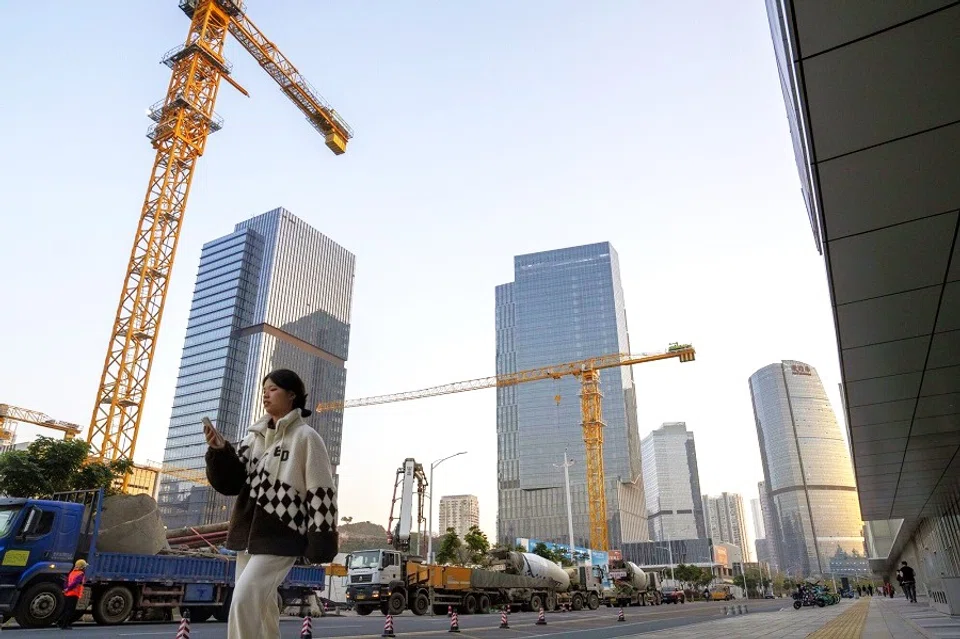How will de-risking impact China's economic fortunes in 2024?
Academic Naoise McDonagh assesses the headwinds in store for China in 2024, as the US and Europe ratchet up their de-risking efforts. It is clear that Brussels and Washington are also trying to calculate the costs they are willing to absorb in the new world of weaponised trade, meaning all sides will have to dance carefully to the tune of de-risking in the year to come.

China's domestic economic woes are well-documented, including growing financial instability, a property sector bogged down by debt and consumer uncertainty, an ageing workforce and the spectre of deflation.
This broad and imposing phalanx of domestic economic problems would challenge any government. Yet China's leaders must simultaneously deal with an ever more difficult international environment, one where its major trade partners the US and the EU are planning a raft of economic de-risking policies in the year ahead.
For an export powerhouse such as China, the narrowing of its external trade potential at a time of domestic economic trouble means 2024 will likely be even more difficult than the tough year just finished.
Looking to the year ahead, an assessment of where de-risking policies stand in Washington and Brussels will offer a window into China's key trade and investment risks in 2024.
New restrictions on US-China economic relationship
Beginning with the view from the US, the activities of the House Select Committee on strategic competition offer a roadmap for Washington's evolving de-risking strategy.
Notably, the committee has strong bipartisan membership and has been loud in calling for tough policies for export controls, investment restrictions, heightened scrutiny of technology transfers and restricted investment access for China.
... the US will continue to ignore WTO rulings against its use of national security exceptions against China.

In the final month of 2023, the committee released a major report claiming China's economic system is "incompatible with the WTO", and called for like-minded partners to create a new multilateral organisation that excludes non-market economies such as China.
While that is unlikely to happen in the medium term, given other major countries have not yet indicated interest in such a radical proposal, it does suggest that the US will continue to ignore WTO rulings against its use of national security exceptions against China. Beijing will therefore find little protection against Washington's de-risking agenda in WTO rules.
Beyond a call for a new multilateral trade institution, the committee's report also lays out three major pillars for transforming relations that include resetting the economic relationship, constricting the flow of US capital and technology to China and domestic industrial policy to "run faster" in the technology race.
If implemented in full, the measures would radically transform the US-China economic relationship. Yet while the committee is influential and bipartisan, it is also advisory only.
During 2024, the report's recommendations will need to be transformed into legislated policy, and during that process, pressures for a less radical approach will come to bear, offering some relief in Beijing.
... even with some inevitable watering down, powerful political support for de-risking within Congress suggests many substantive new restrictions on the US-China economic relationship are certain...

For example, Republicans from agriculture exporting regions in the US were already successful in removing a call from the final report for revoking China's permanent normal trade status with the US out of fear of retaliatory tariffs. Other economic interest groups will also come to bear on the policy-making process, meaning the final effect will be less than what the report calls for.
Yet even with some inevitable watering down, powerful political support for de-risking within Congress suggests many substantive new restrictions on the US-China economic relationship are certain during the year ahead.
EV business in the EU faces uncertainty
If a trade war with Beijing's largest single trade partner is bad for growth prospects, then a second simultaneous trade war with another top trade partner, the EU, is undoubtedly worse.
If a positive finding for Chinese subsidies is returned, as is assumed likely, then a new tariff on imports will be applied to offset China's domestic subsidies and thus reduce the competitiveness of Chinese EV imports.
Chinese firms have begun direct investment in new factories in the EU as a tariff get-around, contributing to a broader trend of firms leaving China for geopolitical reasons.

The paradox here is that as China's domestic economy continues to stagnate and undermine local consumption, this in turn boosts exports as local producers seek to burn off spare capacity. As the US already has a large tariff in place on Chinese automobiles, the EU has become a major export target, explaining the boom in Chinese EV imports in the region.
If this outlet is closed off as part of a new trade war, Chinese producers will struggle to find an alternative large block of middle-class consumers for their EVs.
Chinese firms have begun direct investment in new factories in the EU as a tariff get-around, contributing to a broader trend of firms leaving China for geopolitical reasons. When these factories are operational it will mean new jobs in the EU while inevitably reducing demand for imported Chinese EVs, worsening job prospects in a key export sector for China's growing hoards of unemployed.
Will Chinese citizens be happy to learn quality manufacturing jobs are being outsourced? Ironically historical outsourcing of jobs to China has long created political tensions in developed economies - now China's political leaders may face such dissatisfaction.
Amplifying these wicked economic problems is the fact that Beijing will respond in a tit-for-tat pattern to any measures it sees as unfair.

Hence it is no surprise that China has already denounced the EU's EV probe as "naked protectionism" and quickly announced an anti-subsidy investigation into EU brandy exports, knocking billions off the share value of major French brandy exporting firms that dominate EU exports.
Perhaps it is only a coincidence, but it is worth noting that the French government was instrumental in pushing the EU Commission to investigate Chinese EV imports for illegal state subsidies. In any case, a downward spiralling EU-China economic relationship seems to be assured for 2024.
In the year ahead, de-risking presents a conundrum for China. It is clear that Beijing's historical major trade partners, the US and EU, have reconceptualised their economic relationship with China in a fundamental way, and are operating within a new policy paradigm.
Beijing's responses are likely to amplify rather than resolve trade tensions, placing further drag on an already slowing domestic economy.
China's domestic economy likely to suffer ripple effects
In a growing number of sectors deemed strategic by policy makers, the once-open doors of a WTO-led trade world are being steadily replaced by the ramparts of protectionism. Beijing's responses are likely to amplify rather than resolve trade tensions, placing further drag on an already slowing domestic economy.

Yet with the message for 2024 from China's president being that China must build a "diplomatic iron army" to "defy strong powers", a new round of wolf warrior diplomacy is on the cards, with the economy likely to bear the consequences.
Brussels and Washington are also trying to calculate the costs they are willing to absorb in the new world of weaponised trade, meaning all sides will have to dance carefully to the tune of de-risking in the year to come.





![[Photos] Fact versus fiction: The portrayal of WWII anti-Japanese martyrs in Taiwan](https://cassette.sphdigital.com.sg/image/thinkchina/3494f8bd481870f7c65b881fd21a3fd733f573f23232376e39c532a2c7593cbc)